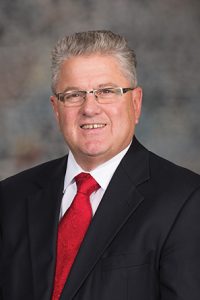Changes sought for nail technology, body art
The Health and Human Services Committee heard testimony Feb. 14 on a bill that would make several changes to state law regulating nail technology and tattoo artists.

Among other provisions, LB607, introduced by Sen. Mark Kolterman of Seward, would:
• create a three-day license for a “guest body artist” enabling him or her to work at a licensed tattoo establishment or under a licensed body artist;
• create the position of nail technology apprentice and allow an apprentice to work under a licensed nail technologist;
• update the definition of cosmetic tattooing;
• add “natural nail” treatment—work done on a person’s nails without adding to the nail—to the definition of manicuring; and
• allow the Board of Cosmetology, Electrology, Esthetics, Nail Technology and Body Art to administer licensing exams in multiple languages.
Kolterman said the bill was intended to update state law at the request of the Board of Cosmetology, Electrology, Esthetics, Nail Technology and Body Art. The guest body artist designation would allow for out-of-state tattoo artists to come to Nebraska, he said.
“This is important as it will allow our state to host body art conventions,” Kolterman said.
Testifying in favor of the bill was Pam Rowland, a licensed nail technician. She said nail technology has the highest risk to public safety in cosmetology and that Nebraska is the only state that does not license natural nail manicures and pedicures.
Rowland said she’s been called as an expert witness in two lawsuits in which the plaintiffs suffered serious infections at a nail salon.
“I don’t want to be called again,” Rowland said.
Lincoln attorney Tony Brock also testified in favor of the bill. He said cases of injury and infection at nail salons are rising.
“They walk in as customers and walk out as patients,” Brock said.
Laura Ebke of the Platte Institute testified against LB607. She said that adding a license requirement for natural nail manicures could create a barrier to entry into a low-wage profession. She asked if there weren’t better solutions to unsanitary salons.
“Can some of these concerns be addressed through inspections of places of business rather than through the licensing of those who may be working there?” Ebke said.
The committee took no immediate action on LB607.

